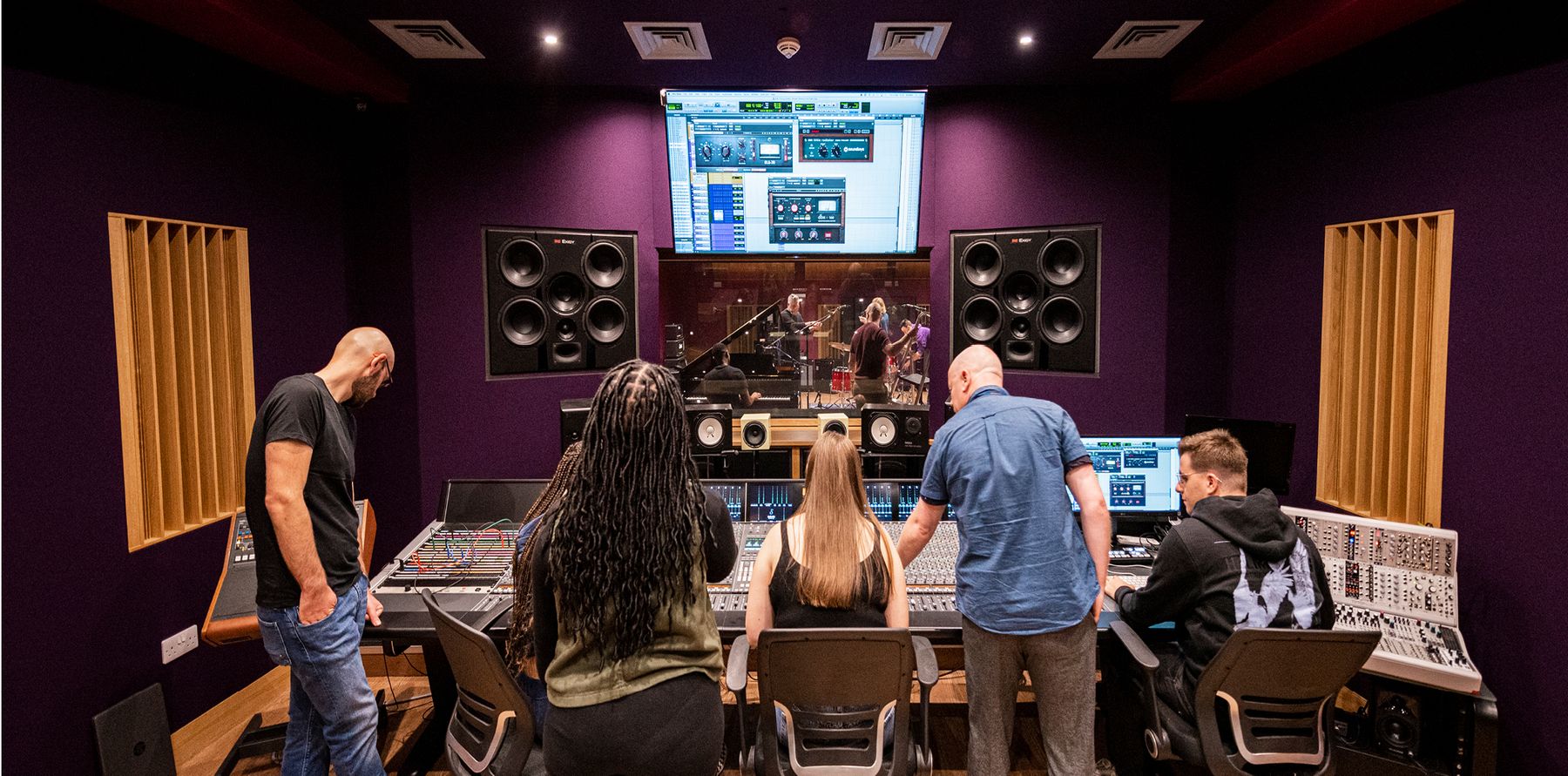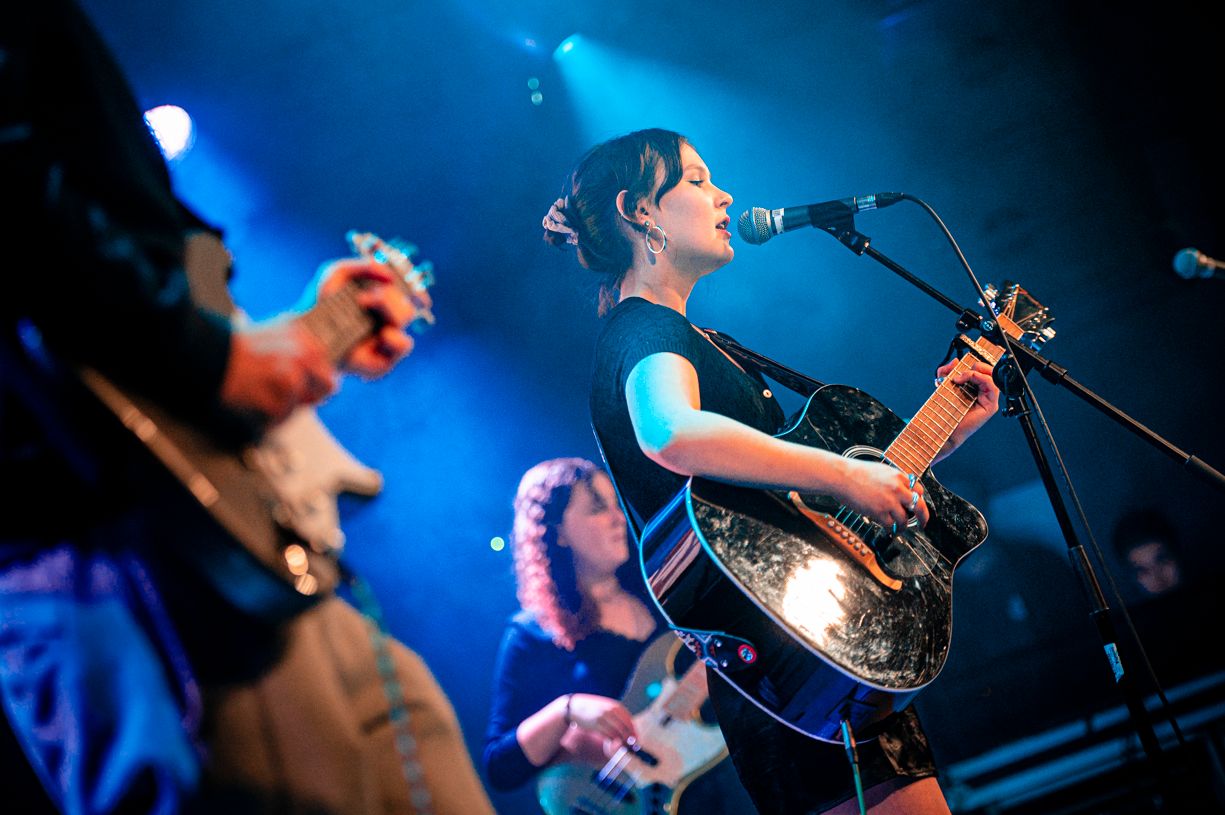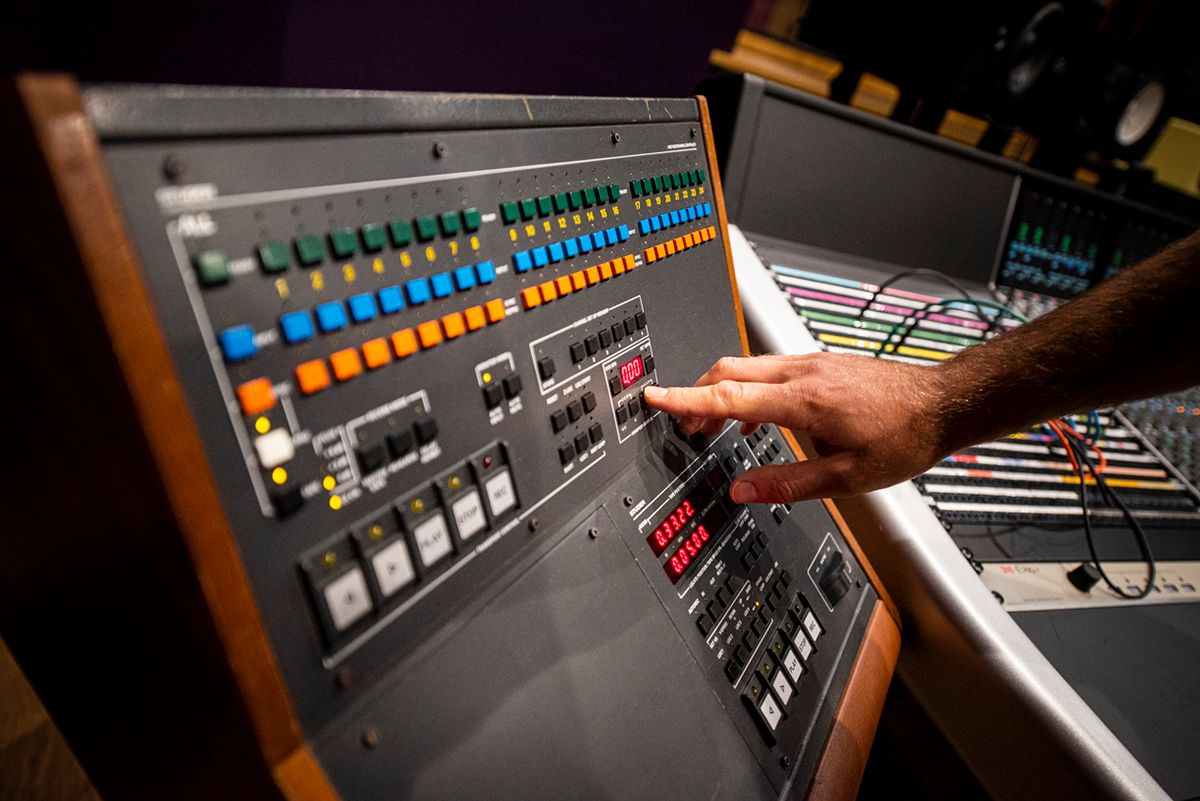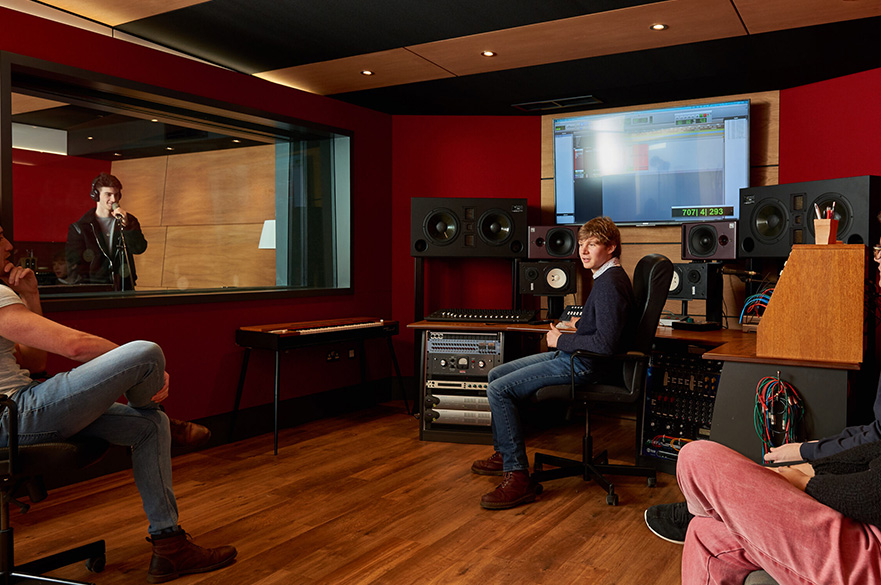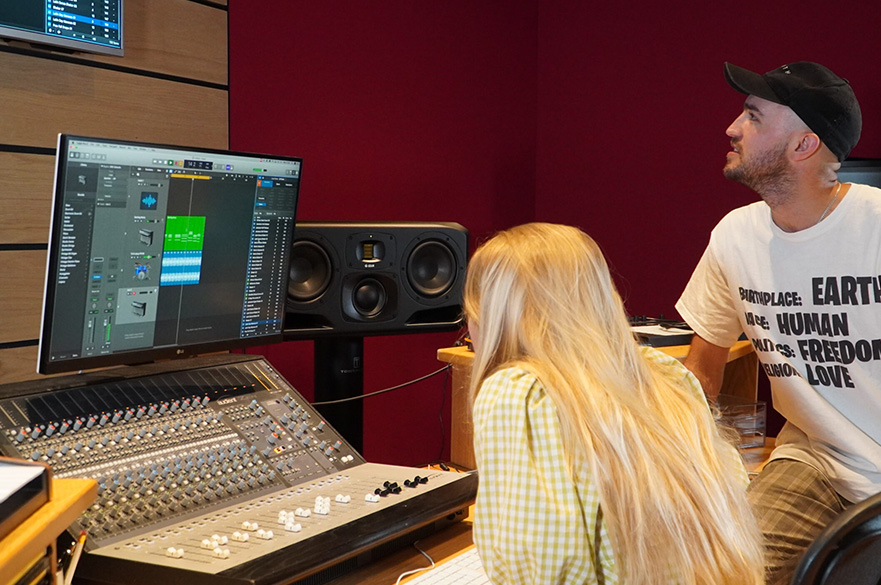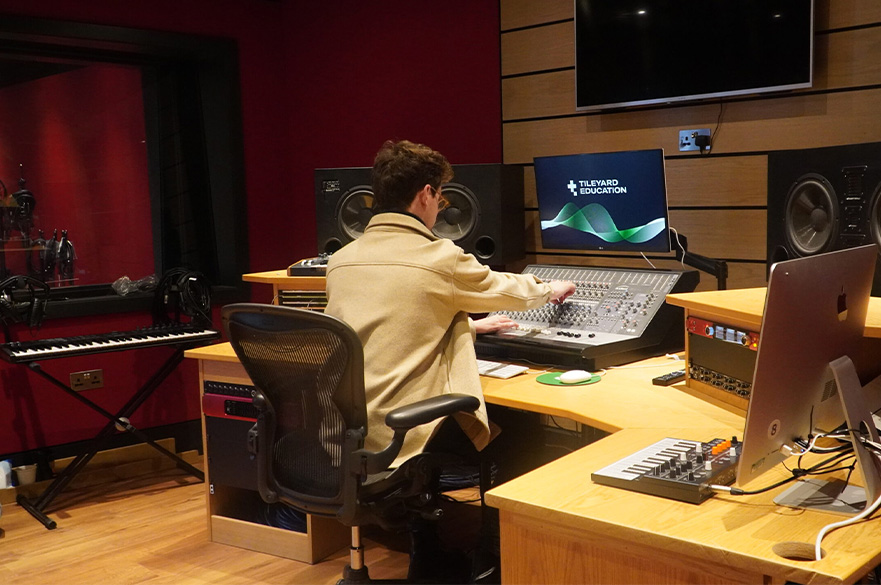Music Production MA
About this course
On this Music Production Masters degree you will be challenged to innovate across a range of disciplines, exploring a variety of creative processes, technological approaches and interaction with current industry methods. You’ll also consider each of these elements in their societal and cultural contexts, conducting research within your chosen area and exploring new avenues at the forefront of the discipline.
Alongside these experiences, you will develop a personalised pathway to your career development, examining the attributes, skills and working practices that are likely to lead you to success in your chosen industry.
This course is suitable for accomplished music producers working in a wide range of popular music disciplines, from pop to country and from hip-hop to metal.
The focus is on preparing you for the reality and opportunities of this exciting and rapidly developing industry.
Take advantage of our in-house record label, Denizen, where you can gain access to industry mentors and grants, to help you progress in your music career.
What you’ll study
Industry exposure at Tileyard
As part of your degree you’ll get exclusive access to the UK’s best music industry insights and connections through our partnership with Tileyard – the world’s largest professional music community.
You can expect regular masterclasses, industry briefs, mentoring and a host of other opportunities to further develop your portfolio, industry knowledge and those all-important connections and contacts.
Creative Entrepreneurial Approaches (Music Production)
(60 credit points)
This module is designed to reflect the entrepreneurial nature of practices in the music and audio sector. Through appropriate negotiated research avenues, you will critically examine current ways of working most applicable to your own journey as a modern music industry professional, whether that’s as an employee, a business owner, or a freelancer with one or more audio/music related activities.
You’ll look for your place in the sector and work towards finding a home there during and after your studies by developing your subject and employability skills along with a relevant outward facing portfolio that considers you as a brand.
You’ll critically examine the work landscape to identify relevant professional opportunities during and after your studies to support your development, and, importantly, explore ways to monetise your talents. You’ll work on specific self-sourced or supplied industry facing projects and these will provide you with the opportunity to examine the skills needed in relevant key music sectors to help you thrive and survive.
In your ‘Practice’ module, you’ll explore and experiment with multiple related skills, and the relevant results of which can be finessed here and included in your work-facing portfolio, too. To give you the best chance to have long-term success you’ll have an assigned mentor from industry to give you a vital insiders perspective.
Ultimately you’ll form an output plan and will pitch for a ‘Confetti Employability Grant’ to help you with your next steps.
Music Production Practice
(60 credit points)
This is your Music Production playground! We all have our specialisms, but have you ever thought how you can apply those skills in related fields? The key to your development is going through the ‘doing’ process in a number of scenarios and examining how you can use what you learned in your own practice.
Through a series of workshops and projects you’ll explore and enhance your processes and skills in these related areas. You’ll experiment and see how related competencies can be developed to increase your employability across the music production sector: You might experiment mapping your studio production skills to live band MD-ing, or your electronic music productions as an artist to write music for media: you’ll work to personalise and apply these techniques to your own practice to enhance what makes you, you!
The key in this module is in the process and reflection, but assets related to your intended employability journey can be honed to completion for use in your ‘Creative Entrepreneurial Approaches’ module to show you at your very best.
Research Project
(60 credit points)
In an ever-shifting and more complex creative industry, the need to source, analyse and process knowledge has never been more important. Research is an essential skill in the toolbox for any creative practitioner wanting to have an extensive and rewarding career in a brave new world of opportunity and challenge.
The Research Project module enables you to collaborate with other creative cohorts and formulate life-long robust research practices. You will learn the essential skills necessary to investigate and synthesise information in order to develop informed conclusions and new and exciting practices. The module will enable you to take a deep dive into your own specialist areas of interest to deliver a large research project.
The project can be delivered in media that most closely align with your creativity, with outputs that could include a whole range of audio, visual or webspace artefacts.
We regularly review and update our course content based on student and employer feedback, ensuring that all of our courses remain current and relevant. This may result in changes to module content or module availability in future years.
How you're taught
The three key approaches to learning and teaching for this course are:
- Active Collaborative Learning
- Learning through Research
- Online or Blended learning
You will participate in workshops, lectures, small group and one-to-one tutoring designed to help you develop the practical and thinking skills that you will need in your chosen career. There is also a collaborative project along with online practice supporting portfolio development.
How you're assessed
You will be assessed in a number of ways, including:
- Written Assignments
- Reports
- Presentations
- Creative outputs/production
- Portfolio
Formative assessment is what we call the opportunities you have to produce and get feedback on work that will help you to prepare to complete your summative formal assessment. There are specific named activities in your assessment and feedback plan which you will be asked to complete and submit for feedback. Additionally, peer, class and individual feedback on your ongoing work is formative.
Assessment tasks are designed to challenge you over the year to increasingly demonstrate your own creativity, reflect your own interests and include independent research.
Careers and employability
Graduates will be equipped to take up roles working as a studio owner, recording engineer, producer, songwriter, mixing engineer, mastering engineer, music for media composer, artist, working for a record label/publisher.
Campus and facilities
You'll learn in our very own live music and events venue, Metronome.
With its unrivalled reputation for the quality of its sound and visuals, Metronome hosts a successful commercial programme of live events throughout the year – and it’s here where you’ll learn from the best and gain real work experience.
This world-class venue is home to some amazing facilities, jam-packed with recording studios, rehearsal rooms, performances spaces, and a 400-capacity venue.
NTU’s City Campus
You'll have access to the facilities at our partner institution, Nottingham Trent University. The NTU City Campus is just a ten minute walk away, and boasts cafes, shops, a gym, a three-story Students’ Union building, and an art gallery. You’ll have full student access to the Boots Library right in the centre of the campus, fully equipped with journals, articles, books and e-resources, as well as a laptop loan service and PCs for student use. There’s also a dedicated postgraduate study room at the Boots Library; a private space for postgraduate students to work and study.
You’ll also be welcome to use the facilities at NTU’s Clifton Campus and Brackenhurst Campus, just outside Southwell.
Accommodation
Our partner institution, NTU, offers accommodation specifically for postgraduate students. You can find out more on their accommodation pages.
Entry requirements
UK students
Academic Entry Requirements:
Entry and admission criteria:
- A minimum of a 2:2 honours degree, or an appropriate equivalent, i.e. a professional qualification, from a recognised British or overseas institution, in a related subject, such as Music Technology, Music Production, Audio Production, Sound Design, Commercial Production, Sound Engineering, Audio Engineering, Game Audio, Audio for Media, Audio for Post Production, Audio for Visual Media, Composing for Media.
- If you don't hold a suitable degree, you should include a link to streamable recordings and/or compositions made with technology and state your role in recording and producing them. Write a short statement on the techniques you used to create the recordings that illustrate your suitability for the course along with any industry related experience
- Non-standard applicants with at least three years' industry experience are also welcome to apply.
- Applicants who do not fully satisfy the general criteria will be considered if they are able to demonstrate that they are capable of successfully undertaking and completing the programme at the required standard. Eligibility may be determined by means of an interview for some applicants.
- Applicants who have been taught and assessed in languages other than English should have an English language equivalent to IELTS 6.5.
Other requirements:
Personal statement:
You should include in your personal statement why you want to study this course and a summary of your knowledge of music production including what instruments, hardware, software, consoles and outboard you use regularly.
Interview:
You'll be invited to an informal interview after you submit your application, to determine your project ideas, your fit with the course, and to discuss your aspirations.
Additional requirements for UK students
There are no additional requirements for this course.
Other qualifications and experience
We welcome applications from students with non-standard qualifications and learning backgrounds and work experience. We consider credit transfer, vocational and professional qualifications, and any work or life experience you may have.
You can view our Recognition of Prior Learning and Credit Transfer Policy which outlines the process and options available, such as recognising experiential learning and credit transfer.
Getting in touch
If you need more help or information, get in touch through our enquiry form.
International students
Academic entry requirements:
- A minimum of a 2:2 honours degree, or an appropriate equivalent, i.e. a professional qualification, from a recognised British or overseas institution, in a related subject, such as Music Technology, Music Production, Audio Production, Sound Design, Commercial Production, Sound Engineering, Audio Engineering, Game Audio, Audio for Media, Audio for Post Production, Audio for Visual Media, Composing for Media.
- If you don't hold a suitable degree, you should include a link to streamable recordings and/or compositions made with technology and state your role in recording and producing them. Write a short statement on the techniques you used to create the recordings that illustrate your suitability for the course along with any industry related experience
Personal statement:
You should include in your personal statement why you want to study this course and a summary of your knowledge of music production including what instruments, hardware, software, consoles and outboard you use regularly.
We accept equivalent qualifications from all over the world. Please check your international entry requirements by country.
English language requirements: See our English language requirements page for requirements for your subject and information on alternative tests and Pre-sessional English.
Additional requirements for international students
There are no additional requirements for this course.
English language requirements
View our English language requirements for all courses, including alternative English language tests and country qualifications accepted by the University.
If you need help achieving the language requirements, we offer a Pre-Sessional English for Academic Purposes course on our City campus which is an intensive preparation course for academic study at NTU.
Other qualifications and experience
We welcome applications from students with non-standard qualifications and learning backgrounds and work experience. We consider credit transfer, vocational and professional qualifications, and any work or life experience you may have.
You can view our Recognition of Prior Learning and Credit Transfer Policy which outlines the process and options available, such as recognising experiential learning and credit transfer.
Sign up for emails
Sign up to receive regular emails from the International Office. You'll hear about our news, scholarships and any upcoming events in your country with our expert regional teams.
Getting in touch
If you need advice about studying at NTU as an international student or how to apply, our international webpages are a great place to start. If you have any questions about your study options, your international qualifications, experience, grades or other results, please get in touch through our enquiry form. Our international teams are highly experienced in answering queries from students all over the world.
Policies
We strive to make our admissions procedures as fair and clear as possible. To find out more about how we make offers, visit our admissions policies page.



